| Article ID | Journal | Published Year | Pages | File Type |
|---|---|---|---|---|
| 7884329 | Cement and Concrete Composites | 2015 | 33 Pages |
Abstract
Up to now, glass capsules, which cannot resist the mixing process of concrete, have been mostly used in lab-scale proof-of-concept to encapsulate polymeric agents in self-healing concrete. This study presents the design of polymeric capsules which are able to resist the concrete mixing process and which can break when cracks appear. Three different polymers with a low glass transition temperature Tg have been extruded: Poly(lactic acid) (PLA) (Tg = 59 °C), Polystyrene (PS) (Tg = 102 °C) and Poly(methyl methacrylate/n-butyl methacrylate) (P(MMA/n-BMA)) (Tg = 59 °C). After heating the capsules prior to mixing with other components of the mix, to shift from a brittle state to a rubbery state, their survival ratio considerably increased. Moreover, a part of the capsules, which previously survived the concrete mixing process, broke with crack appearance. Although some optimization is still necessary concerning functional life of encapsulated adhesives, this seems to be a promising route.
Related Topics
Physical Sciences and Engineering
Engineering
Industrial and Manufacturing Engineering
Authors
Benoit Hilloulin, Kim Van Tittelboom, Elke Gruyaert, Nele De Belie, Ahmed Loukili,
